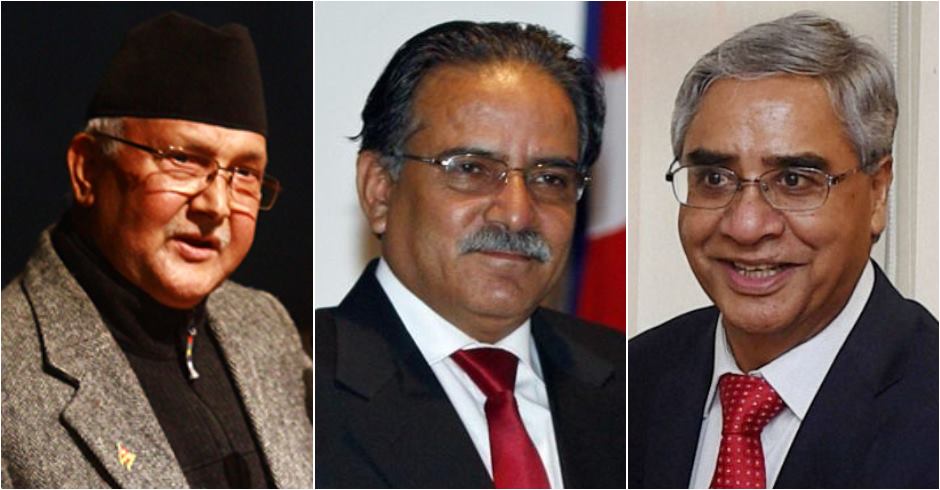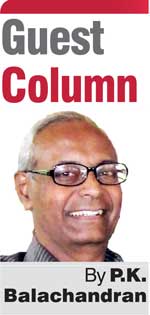Friday Feb 20, 2026
Friday Feb 20, 2026
Saturday, 14 October 2017 12:00 - - {{hitsCtrl.values.hits}}
 From left: K.P. Oli, Pushpa Kamal Dahal alias Prachanda and SherBahadurDeuba
From left: K.P. Oli, Pushpa Kamal Dahal alias Prachanda and SherBahadurDeuba
With Parliamentary elections due on 26November, and the present Parliament ceasing to exist on 22October, Nepal is again standing on the edge of political uncertainty if not a political crisis.
While a change of Government due to an election is only to be expected in a democracy, Nepal has not had stability since monarchy ended in 2006. It has had 10 governments in 11 years.
Early this month, the Maoist Center (MC) led by Pushpa Kamal Dahal ‘Prachanda’ quit the alliance with the Nepali Congress (NC) led by Prime Minister SherBahadurDeuba, and teamed up with the opposition Communist Party of Nepal (Unified Marxist Leninist) led by P.K.Oli and the Naya Shakti Party (NSP) founded last year by former Prime Minister BaburamBhattarai.
This unexpected move jolted Deuba and the entire Nepalese polity. The Government lost its majority. It now has only 246 out of the 593 Members of Parliament. But MC Leader Dahal has assured that his party will continue in the Government till the end of the current Parliament.
However, Dahal has also indicated that he is ready to leave the Government “if asked to”. Media reports say that the MC has been having issues with the NC as the two parties are wedded to two different ideologies. Their compatibility has always been in question. While the NC is Centre-Left, MC is Maoist/Marxist-Leninist. The MC’s natural ally is actually CPN (UML), as both are communist and pro-China to boot, while the NC is seen as pro-India.
Reports also speak of moves to secure a Caretaker Government led by a neutral person till January 2018 by when a new Parliament will have been elected.
 But to defeat this move and stay on in power during the elections, Prime Minister Deuba is said to be planning to postpone the Parliamentary elections till mid-2018.
But to defeat this move and stay on in power during the elections, Prime Minister Deuba is said to be planning to postpone the Parliamentary elections till mid-2018.
The excuse that he is sad to be trotting out is the difficulty of holding elections in the hill areas of the country under the extremely cold weather prevailing between 26 November and 7December.
But the Election Commission has been warning the Government not to take any steps that will hinder the elections. The Chief Election Commissioner, Dr. Ayodhi Prasad Yadav, has said in release that he requests the Government not to take any “unpleasant” decisions on the eve of the elections and not to let any “obnoxious” events or incidents take place in the run up to the polls.
The other option mooted is the formation of a national unity government.
“Consultations are on among parties to form such a government and it is hoped that there will be consensus on maintaining political order before elections,” the Nepalese media quoted Deep Kumar Upadhyay, former Ambassador of Nepal to India, as saying. Upadhyay had resigned recently to contest the coming elections as an NC candidate.
However, the more pressing problem for Deuba is to find a suitable substitute for the MC. He has to find another influential “democratic” partner to take on the consolidated leftist forces comprising the MC, CPN (UML) and the NSP. To match the “leftist and nationalist” front, he has to put together a “democratic” front.
One of the options is to strike a deal with the ‘Madesi’ parties of the Terai or plains region. The Madesis are people of Indian origin who have, for long, been having grievances against the indigenous Nepali political elite of the country.
The Maoist Centre of Dahal has some influence among the Madesis though this might be neutralized by its new ally, the CPN(UML), which has been earning the displeasure of the Madesis by its opposition to their demands in regard to amendments to the September 2015 constitution and the electoral system.
But in an interview in Kathmandu Post recently, IshworPokharel, the General Secretary of the CPN (UML), said that the gap between his party and the Madesis is not unbridgeable as the party’s stand on issues like amending the constitution are “reasonable” and not communal.
The Madesis want the Constitutional provision saying that the “Nepali language written in Devnagari script shall be the language of official business in Nepal” to be amended. But Pokhrel points out that there is another provision which allows provinces to select national languages that are spoken by large numbers of people in that province as languages of official business. Therefore, in Terai, Hindi could be used for official purposes at the provincial level.
“Our Constitution does not promote one language over others, so the argument used by the Madhes-centric parties that it promotes Nepali language and discriminates against others is flawed,” the CPN (UML) asserted.
The second issue the Madhes-centric parties have is about Nepali citizenship.
“But our constitution proposes that foreign women married to Nepali men can obtain naturalised citizenship after initiating the process to renounce their foreign citizenship,” Pokhrel pointed out.
On the Madhesi complaint that the 22 districts in the Tarai region have only 47.27% of the total Parliamentary constituencies while the Madesis are 51% of the Terai population, the CPN (UML) leader said that constituencies are not always formed on the basis of population but also on geographical conditions.
From the international perspective, the worrying aspect is Nepal’s relations with India if the NC-CPN (MUL) comes to power.
While NC is known to be pro-India, the CPN (UML) is dubbed pro-China, while the NC’s stand is nebulous. However, there is no hard and fast line for these parties. They could be pro-India at one juncture and pro-China at another, depending upon their political need and the extent of pressure from the competing Big Brothers across the borders at any given point of time.
On the new alliances policy on India and China, Pokhrel said: “As Nepalis, we lack faith in ourselves. We believe that international powers have a greater say in actions that occur within our country. We have to maintain cordial relations with our two immediate neighbours, India and China. We cannot take sides and must maintain our independence.”
“However, we also have to realise that we rely on India and China for a number of things, and as such, we need to treat our relationship with both countries with respect.It seems that the international community regards these new alliances with optimism; they wish that these parties would work together and resolve their differences.”